TOPICS OF TIIE DAY.
MR. GLADSTONE'S EXPERIENCE.
AT the close of three-quarters of a century, Mr. Gladstone has an even more varied and more fruitful experience to look back upon than Lord Palmerston himself just before his death, though he lived till within two days of the still greater age of eighty-one. But while Lord Palmerston's first twenty years in Parliament were years of blank Toryism,—years of retardation and almost of political petrifaction,—Mr. Gladstone entered Parliament after the great and vivifying change which ensured to the middle-classes of the United Kingdom the power of moulding the destiny of the State. Mr. Gladstone, who was first elected by the ten-pound householders, and who has even now carried the great reform which admits all the householders of the State to take part in returning the House of Commons, has passed his whole political life in the closest possible communication with the spokesmen of the people. For the half-century and more in which he has belonged to the Legislature, he has never known what it was to see the House of Commons apathetic when the people were wronged, or, indeed, failing to reflect all the more impressive vibrations of popular emotion.
Now, on what sort of an instrument has this great experience been brought to play ? During the earlier years of his Parliamentary life, Mr. Gladstone was occupied in writing a book, of which it is the main thesis that the State has a corporate conscience wide enough to include the duty, where there is no conflicting duty imposed by solemn contract, of discriminating religious truth, and propagating it amongst all its subjects ; a book maintaining that this was the only duty which could justify so anomalous an institution as the endowment and establishment in a RomanCatholic nation like the Irish, of a Missionary Anglican Church far too rich for the wants of its own supporters. The sanguine spirit of this book may be traced to the contemporary success of the High-Church revival at Oxford ; and the cautious, apologetic, flexible treatment of difficulties may be regarded as characteristic of the provisional position of a movement compelled to adapt a very High-Church doctrine to a very Low-Church set of Articles of Belief. Mr. Gladstone thus commenced public life with a great faith to prompt him, and a great familiarity with the limits and conditions under which alone he could contend that that faith should be regarded as expressing the conscience of the State. It may be doubted, indeed, whether with his flexible intellect he did not take almost as much pleasure in providing for the various difficulties in the position of the Anglican Church, in minimising those difficulties, in contrasting them with what he thought the still more insuperable difficulties of other Churches, and, in short, in attenuating the objections to the Anglican claims, as he did in anticipating the eventual triumph of the Church. This may be called the main fact of his early political life, that he felt a great Christian organisation behind him, and yet discerned fully the difficulty of bringing that organisation into any plain and easy correspondence with the position of authoritative national teacher which he claimed for it. He had to reconcile that position with the full admission of Roman Catholics and Dissenters to Parliamentary rights. He had to reconcile it with the highly composite and apparently inconsistent elements of doctrine in the Church itself. He had to reconcile it with the rapidlygrowing disposition to emancipate political life from all doctrinal restraints or tests, the complete triumph of which he saw to be clearly inevitable. Mr. Gladstone's statesmanship may be said to have taken its first impress from this necessity. From the first it had the stamp on it which always belongs to a policy conceived under the influence of a great creed. And from the first, too, it had the stamp which always belongs to the position of one who is compelled to make many.concessions, to steer through many difficulties, and not only to take, but to give in order to take.
Then came Mr. Gladstone's official career. the first task of which consisted in so simplifying our tariff as to make the Protectionist system less intolerable by striking-off its superfluous and gratuitous meddlesomeness. Before he had been four years at this absorbingly interesting task, and just as he was learning that this process of attenuating the mischiefs of Protection must go on till it abolished Protection itself, he was compelled, by his own fastidious sense of honour, to surrender his official post on account of the determination of Sir Robert Peel's Cabinet to propose the Maynooth Grant,—a grant which he no longer disapproved, but which he considered wholly untenable on the theory he had adopted of the only justifiable establishment of an unpopular religion,—namely, an establishment for the propagation of truth ; so that here again Mr. Gladstone had learned that the process of attenuating the difficulties of a false theory which he had assumed to be true, led slowly but surely to the rejection of the false theory itself. Moreover, the more Mr. Gladstone pared away needless difficulties in his mistaken theory, whether of finance or of religious establishments, the more good he found in the popular views of both subjects, and the less he was disposed to shrink from the popular demands.
The next period of Mr. Gladstone's public career may be said to have been chiefly devoted to foreign politics, and to have consisted in his persistent effort to enforce inEngland the Christian instead of the proud pagan conception of our duty to other countries. It began in his speec against Lord Palmerston's high-handed Greek policy ; was ntinued in his successful assault on the cruelties of the Neapolitian despotism, and later in the attempt to curb the grandiosity of Lord Palmerston's anti-Russian and pro-Turkish dictatorship during the Crimean War ; and may be said to have ended in his protest against the aggression on China in 1857, though,. indeed, it was followed-up during the last Ministry of Lord Palmerston by a successful attempt to minimise the panic of 1859-60, and to contract the lavish expenditure on the Fortifications Vote. During this period Mr. Gladstone was steadily resisting what appeared at any-rate to be the excess of popular sympathy with an aggressive and defiant attitude towards the rest of Europe. Nor does it seem that on these questions he has ever been disposed to recognise the justice of the popular liking for a "Rule Britannia" policy. Indeed, we may fairly say that Mr. Gladstone has on these subjects converted the people of England, though he has never succeeded in converting either the aristocracy or the middle-class.
Finally, we come to the period of Mr. Gladstone's leadership when, defeated in his attempt to give votes to the better class of artisans, he compelled Mr. Disraeli to enlarge his counterproposals to the full limit of household suffrage ; when he• declared himself against the Protestant Establishment in Ireland as an experiment which no longer even pretended to successful missionary enterprise ; when he passed the Education Act, abolished Purchase in the Army, passed the first Irish Land Act, cast his shield over the Ritualists, exposed the rottenness of the Turkish Empire, resisted the Afghan war, and vindicated the policy of Russia in the East, and, finally, returned to power to carry out the neglected provisions of the Treaty of Berlin, to complete the revolution of the tenurelaws in Ireland, and to extend to the counties the household suffrage which he had compelled Mr. Disraeli to grant to the boroughs.
This is a very long course of political experience, at the merest summits of which we have hastily glanced. But we think we have said enough to bring out its main features. They seem to us to be these. In the first place, a statesman who honestly sets himself to minimise the evils of a mistaken policy, is probably in the way, if he has a really candid mind, to learn the principles of the true policy, and to learn them with an efficiency and a completeness to which a stationary type of mind, even though starting from a much higher level, never attains. Mr. Gladstone's career assures us that a man of open mind, if he admits to himself as much as this that the principles which he defends do involve serious evils, and if he honestly sets himself to mitigate these evils, will have a much more fruitful career than a man of rigid mind, even though brought-up originally in a much wider political school. In the next place, Mr. Gladstone's career teaches us, as few careers have ever taught us, that the school which makes the true domestic policy of the United Kingdom its chief study, and which regards foreign affairs as a secondary, though a most important department of policy, will certainly in the end gain a very great advantage over the school which makes a right policy in foreign affairs its main object, and a true domestic policy only its secondary end. Indeed, this is necessarily putting the cart before the horse ; because, if you do not learn first, and learn thoroughly, what the urgent needs and moral dangers of your own people are, you have not got the most necessary of all the conditions for your guidance in determining the true foreign policy. It may be reasonable to admit that, in spite of some very great and brilliant successes,—in relation, for instance, first to the Italian policy of the British Government, and next to its Eastern policy,—Mr. Gladstone's foreign policy has not had the complete and invariable success of his home policy. But if this be admitted, it must nevertheless be added, that the errors of his foreign policy, founded, as it has been, on a thoroughly just and true view of the national temptations and needs of our people, have been far less important than the errors of Lord Palmerston's foreign policy, which was founded on no such solid basis. Mr. Gladstone has never made such an error as Lord Palmerston made when he did all that was in his power to prop-up Louis Napoleon's pinchbeck Empire, or such an error as Lord Palmerston made when he insisted on using the rotten Turkish Empire as the main bulwark against the relatively civilised and humane power of Russia. Mr. Gladstone illustrates for us, as no other statesman of this century has ever illustrated for us, that a politician the heart of whose belief is Christian faith and that deep sympathy with the people which the Christian faith inspires, will, whatever error he may commit, have before him a far greater prospect than any statesman who makes his chief appeal to the passion for glory and the vulgar elements of national ambition.











































 Previous page
Previous page